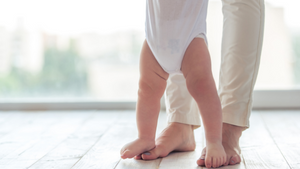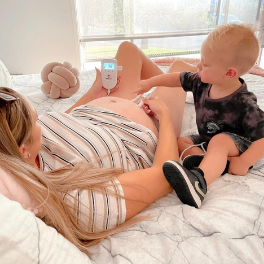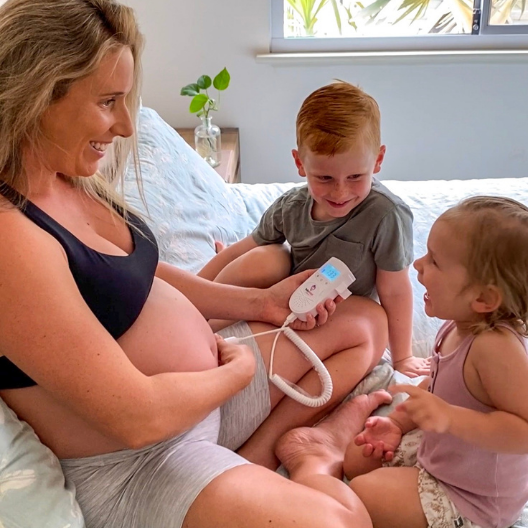
Pregnancy is an amazing time and week by week, you'll be able to marvel at the changes in your body as your little one grows.
Of course, one of the most noticeable changes that you might expect is the growing of your baby bump - but your baby bump might be quite small in the early stages of your pregnancy.
Many women don't actually show a noticeable baby bump until towards the start of their second trimester, so if you're looking at your bump and wondering why it's not more noticeable to the outside world, don't worry, your experience is common!
This can feel confusing because you definitely feel pregnant - your body is changing, your hormones are changing and your life is changing, yet to the outside world, they might have no idea of the whirlwind going on inside of your tummy!
Many women also wonder what a pregnant belly feels like - in early pregnancy, you might also feel a tightness or hardness in your belly, but this doesn’t happen to every woman, so the early signs of pregnancy will be more noticeable internally and less visible as a ‘bump’ or hardness of the belly.
Tip: Your doctor will be able to confirm that your baby is growing at a healthy rate, so stay focused on that and try not to be too concerned if your bump isn't as visible as you'd like it to be.
As your body completely changes to accommodate your growing baby, you’re going to experience lots of symptoms (some unexpected!).
Aside from the usual pregnancy cravings, here are 5 things you can expect as your pregnancy bump grows.
1. Your belly skin and belly button will change
At three months pregnant, when your little one is about the size of a lime, is when most people start 'showing' a baby bump that's noticeable to family, friends and strangers.
At this time, you might also start to notice pregnancy stretch marks appearing on your belly. Stretch marks are tiny tears that occur when the supporting layers of tissue under your skin get pulled tight as your belly stretches.
Anecdotal evidence suggests that more than 50% of pregnant women develop stretch marks so if you're starting to notice streaks on your belly, you're not alone.
Along with stretch marks, your skin may also change in other ways, specifically when it comes to hyperpigmentation.
This is caused by surges of hormones that can cause fluctuating levels of melanin, resulting in spots and lines of hyperpigmentation around your face and body. This can manifest as darker areolas, brown spots on the face and linea negra - a dark, vertical line that extends from your belly button to your pubic area, generally around the 20 week mark of pregnancy.
If you develop this line, don't worry, it's completely normal and it will fade a few months post-delivery. However, if you're concerned about any of your pregnancy hyperpigmentation, make sure to keep any spots and lines covered up when you go into the sun, as sun exposure can intensify skin discolouration during pregnancy.
And on the subject of bellies - If you've got an innie, be prepared for a mild shock as around 26 weeks, your expanding uterus will make your belly button protrude. That's right, your innie will become an outie!
Don't worry, this is totally normal and harmless and your bellybutton will return back to an innie after you give birth and your tummy deflates.
2. You might be able to feel your baby moving in some unexpected ways
Kicks, burps and hiccups are all expected movements that you might feel from your little one as your baby bump grows, but did you know that there are other little signs of movement from your baby that you might be able to feel, like butterflies?
Many pregnant women report feeling a fluttery, jittery sensation in their belly, not too dissimilar to a feeling of mild anxiety or excitement that you might feel before doing something that you're looking forward to - any many women write off this feeling as pre-baby nerves.
However, doctors say that this fluttering sensation is often a sign of your baby squirming or fidgeting!
This movement is referred to as 'quickening' and it usually commences around the four to five month mark in your pregnancy.
And if you're like most women, you'll find that your baby becomes more active as your pregnancy moves along. At around six months, you can expect to feel your little one's feet tapping around.
3. Your body might get very achy
With so many profound changes occurring in your body as it makes room and grows your little one, it's understandable that you'll get a little uncomfortable.
Especially towards the end of your pregnancy, you might notice your bones and muscles all around your body feeling sore, stiff and generally achy. You might also feel sharp pains around your body.
This is because as your round ligaments stretch to accommodate your growing baby bump, they pull and adjust, resulting in sharp stabbing pains that draw out into an overall achy feeling.
And as your baby gets bigger and takes up more space in your womb, your little one starts to feel a little uncomfortable too - so you might notice more jabs from your baby's knees and elbows during the last stages of pregnancy, as they fidget and squirm to try and get comfortable.
To prepare for delivery in the late stages of pregnancy, your body also secretes a hormone called 'relaxin' which stimulates the separation of the pubic bone, which allows the uterine muscle to ease and loosens all the cartilage that keeps your bones together.
The downside of this, is that the hormone also can affect other joints and bones in the body, which is why many pregnant women experience back pain and joint pain.

4. Your brain might start to feel foggy and your mood will change
'Pregnancy brain' is real!
Many pregnant women report memory loss in their pregnancy, whilst others report a general fuzzy feeling of 'brain fog'.
There are a range of reasons why this occurs, from rapid changes to hormones to tiredness to dehydration and exhaustion from morning sickness.
Mood swings, of course, are normal too. Premenstrual syndrome and pregnancy are alike in the changes to mood that hormonal shifts bring - as your hormones go up and down to accommodate the changes required in your body, you might notice yourself feeling moody, irritable, sad, deflated or angry.
This is perfectly normal, and if you normally experience PMS with your periods each month, you might be more likely to experience severe mood swings during pregnancy.
Tip: Keep an eye on your temperature, as hormonal shifts can make your body temperature fluctuate dramatically during pregnancy. The Professional Digital Infrared Thermometer is an easy no-contact way to track your temperature during your pregnancy.
Mood swings tend to occur more in the first trimester and towards the end of the third trimester - during the second trimester, your hormones briefly equalise. Many pregnant women also report feeling depression during pregnancy.
If you have symptoms such as sleep problems, mood swings and changes in eating habits for more than 2 weeks, please talk to your health care provider about what you're experiencing.
5. Your hair and nails may change
Thanks to an increase in oestrogen production during pregnancy, a happy side effect is that you're likely to find your hair and nails looking better than ever - as oestrogen production stimulates the collagen and keratin production involved in your fingernails and hair growing healthy and strong.
You'll likely notice your hair and nails also growing not only much stronger, but much faster.
There is a downside to this, though - just as hair on your head grows much faster, so too does it grow faster everywhere else, including in some places that you previously may not have had hair, such as on the upper lip, stomach, back or nipples.
After birth, as oestrogen levels drop back to normal, your hair follicles go into a little bit of shock and you might start to notice more hair shedding than usual.
Don't stress, this is completely normal and you're not losing your hair - it's all part of the body's normal adjustment period, and most women find that their hair returns to its normal growth cycle within four to six months after giving birth.
* * * * * * * * * *
All of the changes that your body goes through during pregnancy can feel overwhelming, but rest assured that you are not alone, so try to keep yourself focused on the positives to look forward to and the unique experience of being pregnant.
One of the most unique and connecting ways to bond with your unborn child as you navigate pregnancy together is to listen to your baby’s heartbeat using a fetal doppler, like the Standard Fetal Doppler.
Using safe at-home technology, the Fetal Doppler is a fun way that you and your friends and family can check in on your little one between ultrasound appointments. Click here to shop now.








